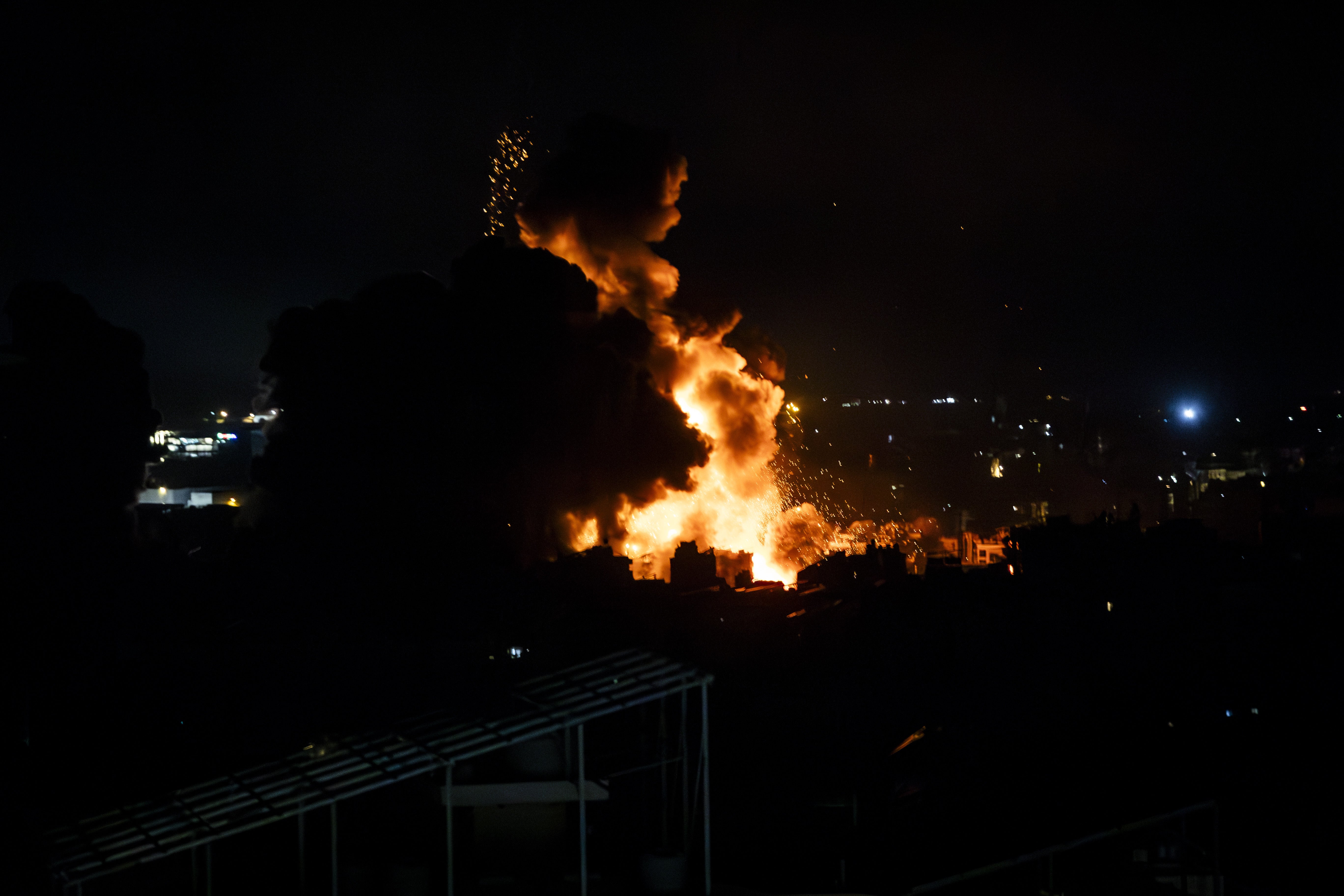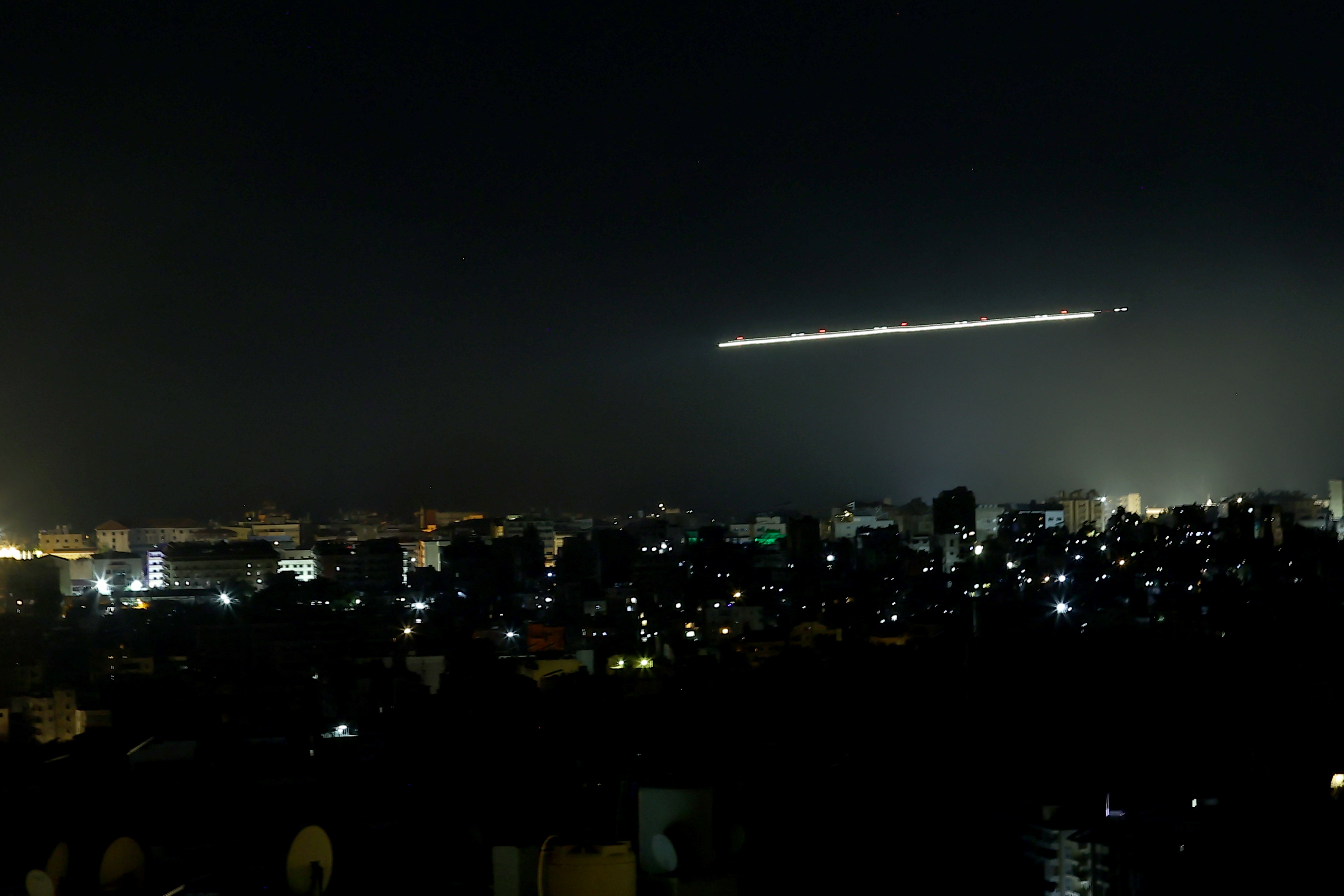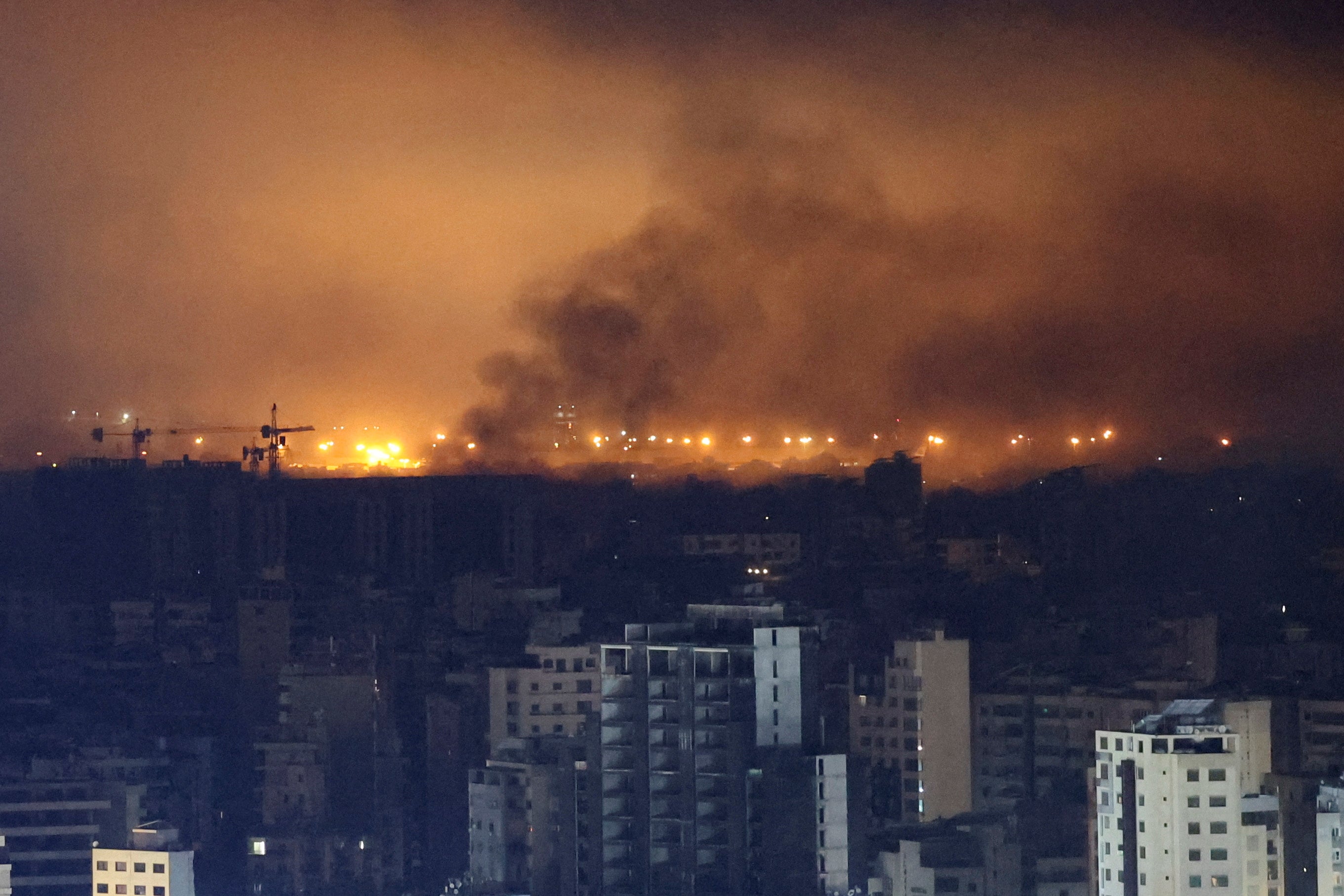Beirut has been rocked by huge explosions with a Lebanese government source claiming at least one Israeli strike had come close to the city’s airport.
Senior Hezbollah official Hashem Safieddine, who is widely regarded as the heir of slain leader Hassan Nasrallah, was a target of the blasts, Axios reported, citing sources.
Civilians were fleeing the series of massive blasts in Beirut’s southern suburbs last night, with state media reporting there were more than 10 consecutive airstrikes.
Witnesses said they saw smoke near Beirut’s international airport while a source in Lebanon’s transport ministry said an Israeli strike had come down outside the perimeter this morning.
Earlier at least nine people were killed and 14 wounded in an Israeli airstrike on Beirut, targeting a building near the parliament.
Meanwhile, Israeli airstrikes killed at least 18 people, including children, in the occupied West Bank in one of the deadliest attacks in two decades, the Palestinian health ministry said.
Israeli strike ‘closes off road’ used to flee Lebanon to Syria
An Israeli strike this morning near Lebanon’s Masnaa border crossing with Syria cut off a road used by hundreds of thousands of people to flee Israeli bombardments in recent days, Lebanon’s transport minister said.
Ali Hamieh told Reuters that the strike hit inside Lebanese territory near the border crossing, creating a 12ft wide crater.
An Israel Defence Forces (IDF) military spokesman had accused Lebanese armed group Hezbollah on Thursday of using the crossing to transport military equipment into Lebanon.
“The IDF will not allow the smuggling of these weapons and will not hesitate to act if forced to do so, as it has done throughout this war,” IDF spokesman Avichay Adraee said on X.
UAE flight delays: How is the conflict affecting international flights?
The late afternoon Emirates flight from London Heathrow to Dubai has an advertised connection to Bangkok of just one hour.
Normally 60 minutes is sufficient for extricating passengers (and, separately, their checked baggage) from the world’s biggest passenger plane, the A380, and enabling them to board another SuperJumbo at a different gate at the airport that handles more international travellers than any in the world, all in the early hours of the morning.
But the remarkable, unrelenting choreography that allows millions of passengers to connect every day at Dubai, Doha, Abu Dhabi and many other hubs is under severe strain as a result of the unfolding humanitarian crisis in Lebanon.
With Russian and Ukrainian skies closed to Western aircraft, the options for flying from Europe to Asia seem to be narrowing by the day.
Simon Calder reports.
Israel strikes Masnaa border crossing between Syria and Lebanon – report
The Israeli military has struck the Masnaa border crossing between Syria and Lebanon with two missiles, halting traffic between the two nations, according to reports.
All departures and entry of passengers and cargo activities were suspended at the border this morning until further notice, authorities said.
Israel has accused the Iran-backed Hezbollah of smuggling weapons from Syria through the border crossing.
Oil jumps over 5 per cent a barrel amid supply worry
Oil prices surged yesterday as concerns mounted that a widening regional conflict in the Middle East could disrupt global crude flows.
Brent crude futures settled up £2.83, or 5.03 per cent, at £59.13 a barrel. US West Texas Intermediate (WTI) crude futures settled up £2.75, or 5.15 per cent, to £56.15.
Market fears are rising over the possibility that Israel might target Iranian oil infrastructure, which could provoke retaliation.
“Markets are in a state of suspense, bracing for Israel’s anticipated retaliation against Iran – a move that could catapult oil prices skyward,” independent markets analyst Stephen Innes, told AFP.
US president Joe Biden said “we’re discussing that” when asked if he would support Israel striking Iran’s oil facilities.“There is nothing going to happen today,” he added.
In Pics: Israel fires barrage of missiles toward Beirut in Lebanon



Children among 18 killed in Israel’s deadliest attack on West Bank in decades
Israeli airstrikes killed at least 18 people, including children, in the occupied West Bank in one of the deadliest attacks in two decades, the Palestinian health ministry said.
“Eighteen martyrs following the bombing of the Tulkarm camp by the occupation,” the ministry said on Telegram.
Last night’s attack reportedly levelled an entire building. An activist in the area told AFP that the airstrike “hit a cafeteria in a four-storey building”.
He added there were “many victims in the hospital”.
The Israeli military earlier said it conducted a strike in Tulkarm in a joint operation with its Shin Bet security service and killed the head of Hamas in the refugee camp.
It said the strike also killed “multiple other significant terrorists”.
Palestinian prime minister Mohammad Mustafa called the attack a “massacre” and accused Israel of ignoring “global calls for justice”.
Biden says he doesn’t believe there will be an ‘all-out war’
US president Joe Biden said yesterday he did not believe there is going to be an “all-out war” in the Middle East, amid Israel’s assault on Lebanon and Gaza and rising tensions with Iran.
Asked how confident Mr Biden was that such a war can be averted, he told reporters: “How confident are you it’s not going to rain? Look, I don’t believe there is going to be an all-out war. I think we can avoid it.”
“But there is a lot to do yet, a lot to do yet,” he added.
Britons urged to leave Lebanon now – but what are their travel options?
As Israel attacks targets in central Beirut, the UK Foreign Office has run the first evacuation flight from Lebanon to help British citizens, their spouses and children under 18 to leave the country.
The plane from Beirut touched down at Birmingham airport on Wednesday evening carrying “more than 150 British nationals and dependents”, according to the Foreign Office.
More evacuation flights are planned. The government says they “will continue for as long as the security situation allows”.
But the Foreign Office warns: “Do not rely on FCDO being able to evacuate you in an emergency.”
Simon Calder has more.
British man ‘will be stranded in Israel for weeks as there are no flights out’
A British man has said he will be stranded in Israel for weeks because of a lack of commercial flights out of the country to the UK.
Keith Ottaway, 46, originally planned to return to the UK on September 24 after visiting his partner in Israel, but successive flights were cancelled.
He said the next available ticket with Israeli flag carrier airline El Al is not until 21 October.
Sam Hall reports:
UN peacekeepers in Lebanon stay put despite Israel asking them to move
United Nations peacekeepers in southern Lebanon remain in place – despite Israel asking them to move – and provide the only communications link between the countries’ militaries, the UN peacekeeping chief said on Thursday.
“Peacekeepers continue to do their best to implement their Security Council mandate in obviously very difficult conditions,” UN peacekeeping chief Jean-Pierre Lacroix told reporters, adding that contingency plans were ready for both good and bad outcomes.
The mission, known as UNIFIL, is mandated by the Security Council to help the Lebanese army keep the area free of weapons and armed personnel other than those of the Lebanese state. That has sparked friction with Iran-backed Hezbollah, which effectively controls southern Lebanon.
The Israeli military asked UN peacekeepers earlier this week to prepare to relocate more than 5 km (3 miles) from the border between Israel and Lebanon – known as the Blue Line – “as soon as possible, in order to maintain your safety,” according to an excerpt from the message, seen by Reuters.
“The peacekeepers are currently staying in their position, all of them,” Lacroix told reporters. “The parties have an obligation to respect the safety of and security of peacekeepers, and I want to insist on that.”
Lacroix said UNIFIL was continuing to liaise with both countries, describing the mission as “the only channel of communication” between them. The mission was working to protect civilians and support the safe movement of civilians and delivery of humanitarian aid.
The UN peacekeepers operate between the Litani River in the north and the Blue Line in the south. The mission has more than 10,000 troops from 50 countries and about 800 civilian staff, according to its website.
Israel’s military told residents of more than 20 towns in south Lebanon to evacuate their homes immediately on Thursday as it pressed on with its cross-border incursion and struck Hezbollah targets in a suburb of Beirut.
Source: independent.co.uk



